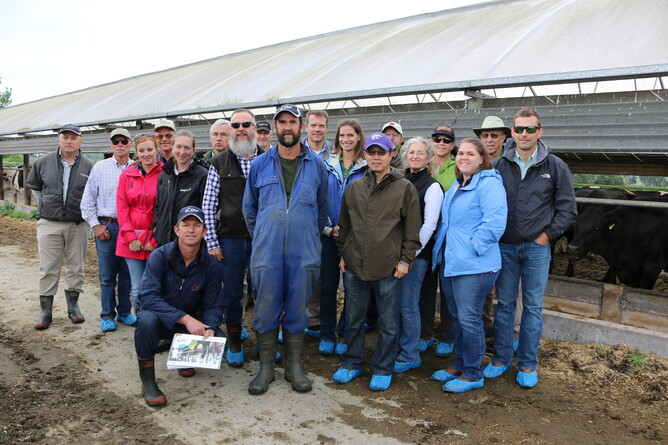CRV Ambreed hosts American Forage & Grassland Council
CRV Ambreed has shown members of the American Forage & Grassland Council how to get the best out of dairy cow genetics in a hybrid farming system on a client's Waikato farm.
CRV Ambreed Global Product Manager Grazing Peter van Elzakker hosted 22 council members, led by University of Georgia College of Agricultural and Environmental Sciences Associate Professor Dennis Hancock, on client John Pouls' dairy farm north of Te Awamutu. Forage extension specialist Professor Hancock met Mr van Elzakker through CRV USA.
Mr Pouls, who has been using CRV Ambreed genetics in his herd for 40 years, milks about 250 cows on 65 ha, serviced by a Herd Home where the herd is fed and effluent is collected for fertiliser.
The Pouls operation aims to feed the cows about 22 kg of dry matter a day; about 60% of this is fresh grass, with the rest fed through a mixed ration of grass silage, maize silage and beets delivered to the Herd Home. In the winter the dry herd stays inside the home.
The Herd Home captures the herd's effluent which is applied to the land as required, so no extra nitrogen and phosphate needs buying.
The operation calves 100 in the spring and 100 in the autumn. Production per cow is approximately 600 kg of milksolids.
"The purpose for the visit with CRV and this farm was to give the American Forage & Grassland Council group a balanced view of how and what genetics fit into grazing systems," Mr van Elzkker said.
"In the US they build their system around the cows and genetics they have there. We are also system-focused but in New Zealand the cow has to fit in to the farmer's chosen system. John's hybrid system is a great example of the average grazing system you will encounter in the US."
Professor Hancock said Mr van Elzakker, through CRV USA, had been instrumental in educating US farmers about systems such as the Pouls operation.
"There's been a real challenge to the supplement-led system in the south east over the last seven or eight years, thanks to the volatility in international dairy prices," Professor Hancock said.
"We are seeing more farmers moving towards hybrid systems like the Pouls operation to reduce costs, because expenses are high in a supplement-driven system. So, most of our group is really here to get a sense of the Kiwi model."
The trip was organised by AgriTravel managing director Karen Baldwin.
The group will head on to the NZ Grassland Association Annual Conference in Timaru next week.
CRV Ambreed Global Product Manager Grazing Peter van Elzakker hosted 22 council members, led by University of Georgia College of Agricultural and Environmental Sciences Associate Professor Dennis Hancock, on client John Pouls' dairy farm north of Te Awamutu. Forage extension specialist Professor Hancock met Mr van Elzakker through CRV USA.
Mr Pouls, who has been using CRV Ambreed genetics in his herd for 40 years, milks about 250 cows on 65 ha, serviced by a Herd Home where the herd is fed and effluent is collected for fertiliser.
The Pouls operation aims to feed the cows about 22 kg of dry matter a day; about 60% of this is fresh grass, with the rest fed through a mixed ration of grass silage, maize silage and beets delivered to the Herd Home. In the winter the dry herd stays inside the home.
The Herd Home captures the herd's effluent which is applied to the land as required, so no extra nitrogen and phosphate needs buying.
The operation calves 100 in the spring and 100 in the autumn. Production per cow is approximately 600 kg of milksolids.
"The purpose for the visit with CRV and this farm was to give the American Forage & Grassland Council group a balanced view of how and what genetics fit into grazing systems," Mr van Elzkker said.
"In the US they build their system around the cows and genetics they have there. We are also system-focused but in New Zealand the cow has to fit in to the farmer's chosen system. John's hybrid system is a great example of the average grazing system you will encounter in the US."
Professor Hancock said Mr van Elzakker, through CRV USA, had been instrumental in educating US farmers about systems such as the Pouls operation.
"There's been a real challenge to the supplement-led system in the south east over the last seven or eight years, thanks to the volatility in international dairy prices," Professor Hancock said.
"We are seeing more farmers moving towards hybrid systems like the Pouls operation to reduce costs, because expenses are high in a supplement-driven system. So, most of our group is really here to get a sense of the Kiwi model."
The trip was organised by AgriTravel managing director Karen Baldwin.
The group will head on to the NZ Grassland Association Annual Conference in Timaru next week.

